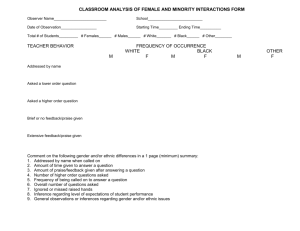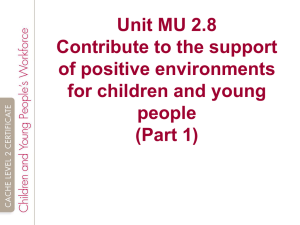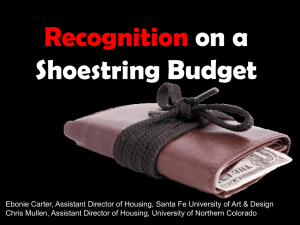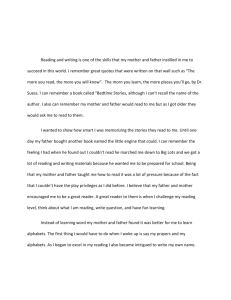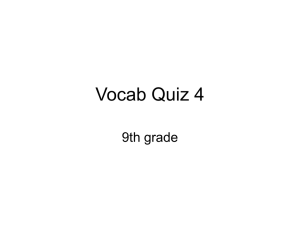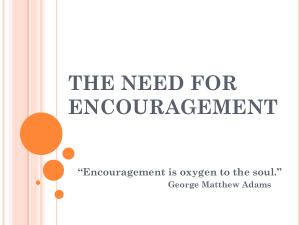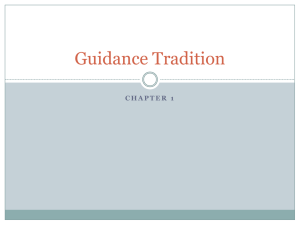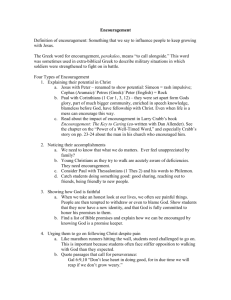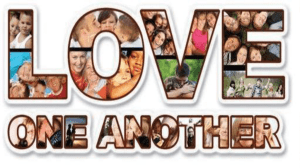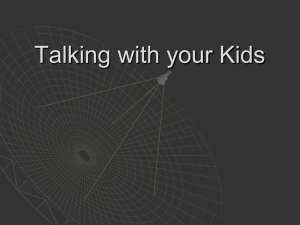Celebrating Achievement
advertisement
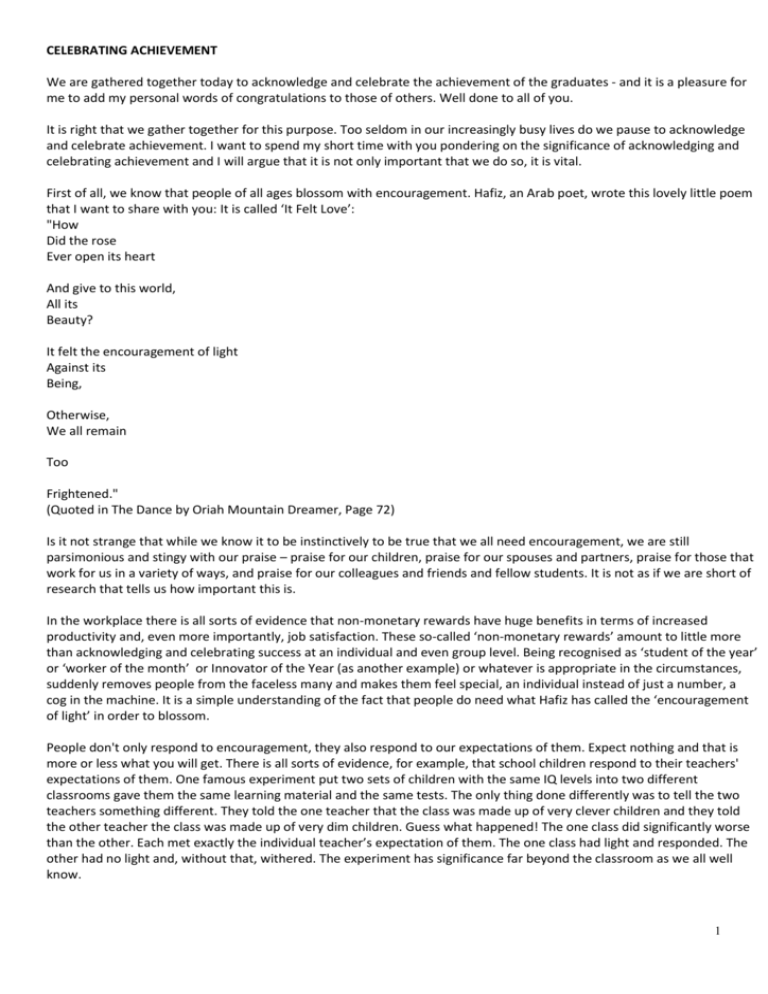
CELEBRATING ACHIEVEMENT We are gathered together today to acknowledge and celebrate the achievement of the graduates - and it is a pleasure for me to add my personal words of congratulations to those of others. Well done to all of you. It is right that we gather together for this purpose. Too seldom in our increasingly busy lives do we pause to acknowledge and celebrate achievement. I want to spend my short time with you pondering on the significance of acknowledging and celebrating achievement and I will argue that it is not only important that we do so, it is vital. First of all, we know that people of all ages blossom with encouragement. Hafiz, an Arab poet, wrote this lovely little poem that I want to share with you: It is called ‘It Felt Love’: "How Did the rose Ever open its heart And give to this world, All its Beauty? It felt the encouragement of light Against its Being, Otherwise, We all remain Too Frightened." (Quoted in The Dance by Oriah Mountain Dreamer, Page 72) Is it not strange that while we know it to be instinctively to be true that we all need encouragement, we are still parsimonious and stingy with our praise – praise for our children, praise for our spouses and partners, praise for those that work for us in a variety of ways, and praise for our colleagues and friends and fellow students. It is not as if we are short of research that tells us how important this is. In the workplace there is all sorts of evidence that non-monetary rewards have huge benefits in terms of increased productivity and, even more importantly, job satisfaction. These so-called ‘non-monetary rewards’ amount to little more than acknowledging and celebrating success at an individual and even group level. Being recognised as ‘student of the year’ or ‘worker of the month’ or Innovator of the Year (as another example) or whatever is appropriate in the circumstances, suddenly removes people from the faceless many and makes them feel special, an individual instead of just a number, a cog in the machine. It is a simple understanding of the fact that people do need what Hafiz has called the ‘encouragement of light’ in order to blossom. People don't only respond to encouragement, they also respond to our expectations of them. Expect nothing and that is more or less what you will get. There is all sorts of evidence, for example, that school children respond to their teachers' expectations of them. One famous experiment put two sets of children with the same IQ levels into two different classrooms gave them the same learning material and the same tests. The only thing done differently was to tell the two teachers something different. They told the one teacher that the class was made up of very clever children and they told the other teacher the class was made up of very dim children. Guess what happened! The one class did significantly worse than the other. Each met exactly the individual teacher’s expectation of them. The one class had light and responded. The other had no light and, without that, withered. The experiment has significance far beyond the classroom as we all well know. 1 I am a voracious reader of biographies and autobiographies. In my readings I am struck by how often the writer acknowledges the role of the mother (mostly) and sometimes the father, but usually someone in their life who believed in them, someone who mentored them, someone who helped along the way when the going was rough. This too is instructive for all of us in the many roles we play in life - mother, father, sister, brother, friend, teacher, mentor, line manager etc. We have a fundamental responsibility that we discharge badly at enormous cost to the people who should have been able to rely on us. I am quite sure that there are many people here today who have someone special in their life who gave them that encouragement, who believed in them and in so doing bathed them in the light they needed to blossom. I would like to pause briefly to acknowledge and celebrate those people's selfless acts of love and responsibility. To the parents and family and friends here today who have supported our graduates: good on you! You might well be imagining that I believe that everybody has only to be encouraged in order to succeed. In an odd sort of way I am saying that. I truly believe that each person does indeed have a special talent – something that they are good at. The people who we are acknowledging today are fortunate in that they have found what it is that they are good at. In saying that I am in no way downgrading the importance of hard work and perseverance and the sheer guts that goes into taking on a difficult task and seeing it through to conclusion. I salute you for that. What I am also saying however is that many people have still to find what it is that they are good at. I am sustained in my belief that everyone does have some special talent by the work of Howard Gardner and others on the subject of multiple intelligences. He and his fellow researchers have described a whole range of different kinds of intelligence: analytic, musical, spiritual, sporting and others. The tragedy is that much of our education system and certainly most of our schooling system focuses only on one or two of these and if our children do not score on these scales they are often labelled as failures. This is a gross miscarriage of justice to say nothing of the human tragedy that follows in its wake and the waste of talent that remains untapped. Neither parents nor the students themselves should accept this. I, and many like me, are convinced that if we can identify what it is that people are good at and encourage them accordingly, their accomplishments will have no bounds. For once we have tasted the sweetness of success and once we have eaten the fruit of understanding, the motivation will be there to pursue knowledge and understanding – and even become creators of knowledge and understanding. My hope is that the understanding that comes to you in this endeavour will be that it is not only to yourself that you have a responsibility but to the people around you – your family, your colleagues, your community – close at hand and beyond. Because once you know that you can beat the odds, can succeed beyond your own expectations, have succeeded beyond your earlier expectations, then you become a powerful role model for other people who have not yet reached that understanding. You can become a marvellous agent of change, an inspiration to others. And that is an important responsibility - indeed, its acceptance is the core of a humane society, one where individuals understand their place in the community, their role as global citizens - their simple concern for others – and with that concern, action for a better world. I quote the Czech playwright and political leader Vaclav Havel who said all this more eloquently than I can: "Regardless of where I begin my thinking about the problems facing our civilization, (he said) I always return to the theme of human responsibility, which seems incapable of keeping pace with civilization and prevent it from turning against the human race. It's as though the world has simply become too much for us to deal with. The main task for the coming era is something else: a radical renewal of our sense of responsibility. Our conscience must catch up to our reason; otherwise we are lost." (Quoted in Gardner, page 251) Ladies and gentlemen, we live in a world that is badly in need of healing. Education should equip us to make a difference if we care. Men and women alike, my hope for you here today is that you make the most of the opportunities that are now within your grasp, help to create new ones for those who come later, make the world a better, fairer and safer place for everybody. My best wishes to you. 2
